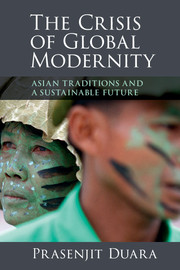Book contents
- Frontmatter
- Epigraph
- Contents
- List of figures and maps
- Preface and Acknowledgements
- Introduction
- 1 Sustainability and the crisis of transcendence
- 2 Circulatory and competitive histories
- 3 The historical logics of global modernity
- 4 Dialogical and radical transcendence
- 5 Dialogical transcendence and secular nationalism in the Sinosphere
- 6 The traffic between secularism and transcendence
- 7 Regions of circulation and networks of sustainability in Asia
- Reprise and Epilogue: of reason and hope
- Bibliography
- Index
- References
3 - The historical logics of global modernity
Published online by Cambridge University Press: 05 January 2015
- Frontmatter
- Epigraph
- Contents
- List of figures and maps
- Preface and Acknowledgements
- Introduction
- 1 Sustainability and the crisis of transcendence
- 2 Circulatory and competitive histories
- 3 The historical logics of global modernity
- 4 Dialogical and radical transcendence
- 5 Dialogical transcendence and secular nationalism in the Sinosphere
- 6 The traffic between secularism and transcendence
- 7 Regions of circulation and networks of sustainability in Asia
- Reprise and Epilogue: of reason and hope
- Bibliography
- Index
- References
Summary
In this chapter, I will develop the analytics to grasp what I am calling global modernity and in particular to grasp the crisis of sustainability that it has produced. At the same time, by viewing modernity in a wider global and historical framework, I will explore the conceptual grounds for a more sustainable modernity. Analysts of modernity from at least Hegel through the modernization theorists have explored the philosophical and sociological conditions of rational approaches that promise material and spiritual emancipation. Yet, these approaches have not only had exorbitant historical costs, but they have also generated counter-finalities – Jean-Paul Sartre’s term – and what Ulrich Beck specifies as ‘reflexive’ or ‘second’ modernity to refer to the modernity of advanced capitalist societies. ‘Second’ modernity is no longer concerned with development per se but with management of the risks that are typically compounded by earlier modernization achievements (such as the nuclear fallout from the Japanese tsunami). Today the counter-finality stares us in the face as the crisis of planetary sustainability in the Anthropocene.
By exploring the global and historical underside of modernity, we can gain a more comprehensive view of our situation today when the rest of the world is seeking to catch up with the North Atlantic model of life. Further, I want to show how an alternative set of dynamic concepts can lead us to recover a relatively neglected source of historical transformations that may be critical to achieving a sustainable modernity. Among these concepts is the notion of ‘transcendence’, which, in my view, works – among its other functions – to control, direct and channel the ceaseless circulatory networks that transform society. To anticipate a principal theme of the chapter, the ‘high Culture’ of transcendent ideas seeks to anchor, subordinate and deploy the ‘small culture’ of circulatory transformations to its own projects and purposes. What differentiates modernity from such earlier modes is not merely the accelerating transformations of capitalism, but also the disenchanted cosmology of linear time that brooks no limits to the human conquest of nature.
- Type
- Chapter
- Information
- The Crisis of Global ModernityAsian Traditions and a Sustainable Future, pp. 91 - 118Publisher: Cambridge University PressPrint publication year: 2014

